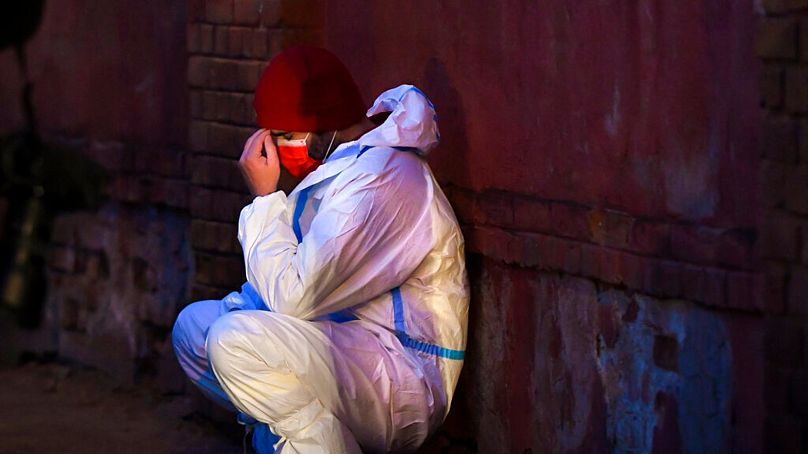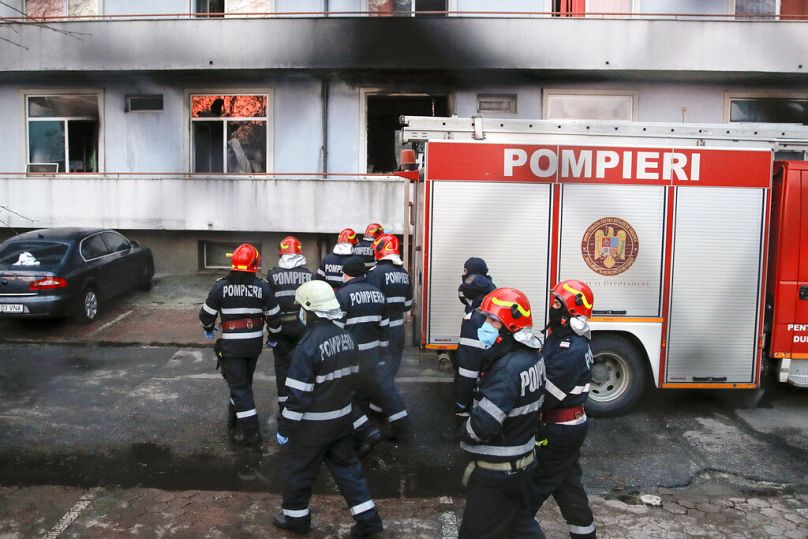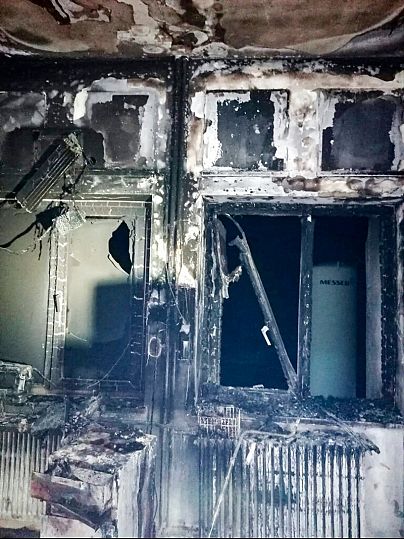Romania has suffered three deadly hospital fires in less than a year.
Three deadly hospital fires in under a year have raised the alarm about the state of Romania's healthcare system.
 ADVERTISEMENT
ADVERTISEMENT
 ADVERTISEMENT
ADVERTISEMENT
In November 2020, 10 people died after a blaze engulfed an intensive care unit treating intubated COVID-19 patients in the northern town of Piatra Neamt.
It caused considerable shock in a country that in recent years has been plagued by a multitude of healthcare scandals.
But as criminal and forensic investigations continue more than two months later, another hospital tragedy rocked the country.
In late January, a fire broke out on a COVID-19 ward in Bucharest’s Matei Bals hospital, killing 12 people.
That such a calamity could happen again, in such a short space of time and at one of Romania’s largest and best-funded hospitals, prompted President Klaus Iohannis to call for urgent and “profound” reform. Tragedies like that, he said, “must not happen again.”
Then, in October 2021, at least nine people died in another hospital blaze, this time in the Black Sea port city of Constanta.
'Predictable tragedy'
For Dr Bogdan Tanase, the head of Romania’s Doctors' Alliance, that people are dying in hospital fires in a country that has been an EU member since 2007, did not come as a shock.
“It was a predictable tragedy because of the old infrastructure,” Dr Tanase told Euronews. “We work in hospitals built in the 70s and 80s in the overwhelming majority — rooms are small, the circuits inadequate, the sanitation and electrical installations are very old.”
Bucharest’s Matei Bals Institute for Infectious Diseases was built in 1953 but has benefitted from consistent funding and renovation works. The hospital has been at the forefront of the country’s fight against coronavirus — which has killed more than 18,000 people in Romania and infected more than 730,000.
“The only unpredictable thing was where it happened — in a very well-financed hospital,” Dr Tanase said.
In the short time between the two deadly hospital blazes — the causes of which remain undetermined — at least three other fires have broken out at medical facilities in the country, in one case resulting in the death of a patient at a psychiatric hospital.
In the aftermath of the Piatra Neamt fire, then-health minister Nelu Tataru said that the blaze was “most likely triggered by a short circuit”.
'Ignorance and no clear strategy'
The string of hospital fires has revealed deep cracks in Romania’s healthcare system. According to Eurostat, Romania has the highest rate of avoidable deaths in the EU of under-75s — at 80% compared to 68% across the bloc.
In the last 31 years — since communism ended — only one state hospital has been built in the country. Romania has the lowest healthcare spending in the EU relative to GDP at 5.2%, which compares to an EU average of almost 10%.
“The most striking effect of low government spending on healthcare is the very poor infrastructure,” said Dr Tanase. “There is an absence of a coherent strategy, of clear objectives, and more importantly — an ignorance about the needs for healthcare in the general population.”
Low spending on healthcare may indeed be a major catalyst for the myriad problems in Romania’s healthcare sector.
Many other issues, in a country where cash bribes for doctors are commonplace, have stunted development. High levels of corruption, politicised and inefficient management, and high levels of emigration among the country’s medical personnel are pervasive issues.
Since Romania joined the EU in 2007, tens of thousands of medical workers have moved to other EU countries where wages are higher and conditions better. This has led to a shortfall of medical staff nationwide of around 40,000.
After a deadly nightclub fire in Bucharest in 2015, the depths of decay in the healthcare sector were laid bare. More than half of the 64 victims who died did so in bacteria-riddled hospitals after the fire. Local investigative journalists discovered that the widespread use of sham medical disinfectants may have been a prime factor.
The blaze, which was found to have flouted safety regulations, sparked huge street protests, a government resigned, and the slogan “Corruption Kills” came to symbolise both endemic corruption and the well-documented woes of Romania’s healthcare system.
'In four years nobody can build what has not been built in 30'
But now, following the two deadly fires, change may be on its way.
Romania’s new coalition government — elected in December and by led by prime minister Florin Citu — announced yesterday that it has accessed €50 million in EU funds that will be used to upgrade healthcare infrastructure to improve patient safety.
“It’s part of a bigger effort to channel EU funds previously dedicated to infrastructure projects toward the healthcare system,” Cristian Ghinea, minister of investments and European projects, told Euronews. “Today’s decision was to dedicate part of the money to small but urgent anti-fire projects.”
The money is a tiny sum in the grand scheme of things, but it may save lives. It will be used to evaluate and modernise medical infrastructure such as electrical installations, medicinal gas networks, and ventilation systems.
“The previous government had the idea to access these funds, but they got stuck in intergovernmental procedures — a real disease of policymaking in Romania,” Ghinea said.
The minister added: “We just cut the crap and delivered real policy results.”
After the Matei Bals fire, Romania’s pro-reformist health minister, Vlad Voiculescu — who served the same ministerial post for a few months in 2016 — was clear about why such fire tragedies are hitting Romania’s hospitals.
“The reality is that the overwhelming majority of our hospitals are simply the result of chronic underfunding, and non-transparent acquisitions that resulted in a long line of improvisations made by little and poorly paid technical staff,” the health minister said.
Before his ministerial postings, Voiculescu — who has promised to build new hospitals — devised a system to help cancer patients acquire hard-to-find drugs from abroad; he also helped to set up a special facility for children with cancer.
“We will implement urgent measures in every hospital so that tragedies like those at Matei Bals or Piatra Neamt do not repeat,” he said.
The former banker’s civic track record is indeed impressive, and he now has a four-year term as minister to initiate institutional change in a healthcare system he has been highly critical of.
Whether he can force a reverse on decades of neglect and corruption in such a timeframe will be his biggest challenge yet.
“In four years nobody can build what has not been built in 30 years,” said Dr Tanase.
Every weekday at 1900 CET, Uncovering Europe brings you a European story that goes beyond the headlines. Download the Euronews app to get an alert for this and other breaking news. It's available on Apple and Android devices.













